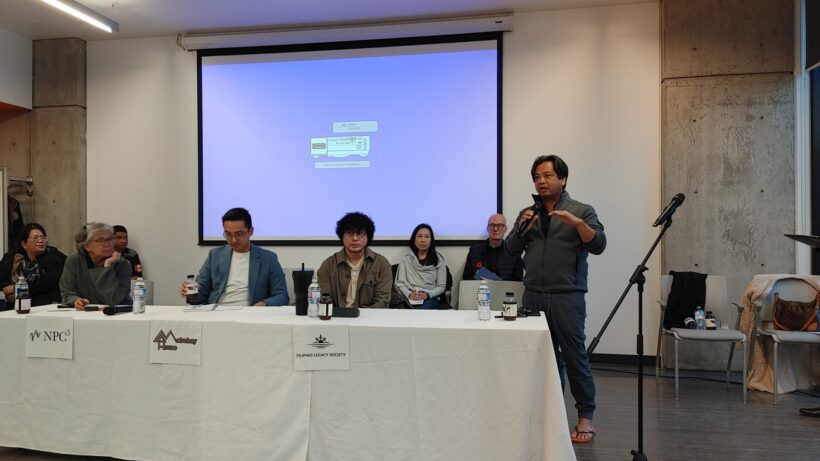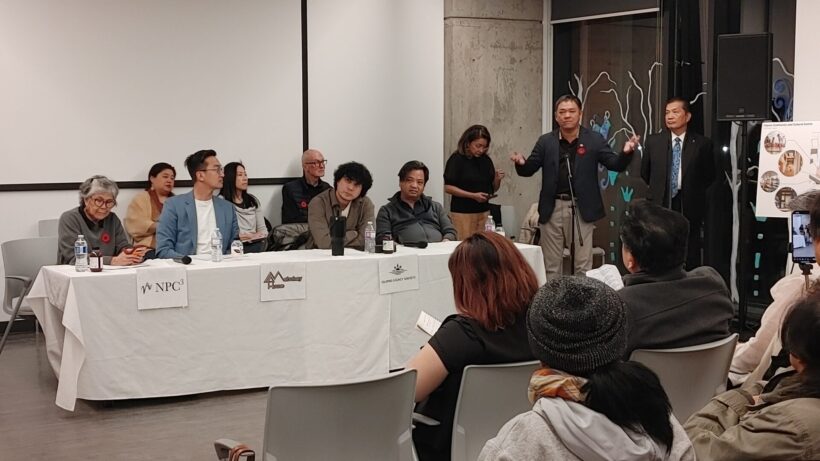by Maria Veronica “Vernie” G. Caparas, PhD*
When British Columbia held the provincial elections in October 2024, the month-long campaign for Mable Elmore and her party, the British Columbia National Democratic Party (BC NDP), included this political jingle composed on 13 September 2024.
Vancouver Kensington Mable Elmore’s Pride and Joy
BC NDP Fights for
Affordable Housing
Better Health Care
Climate Justice
Inclusive Economy
Safe Communities
Food Security
Workers’ Rights
Vancouver Kensington Vote Mable Elmore (2x)
And Mable Elmore notched an overwhelming win in Vancouver Kensington riding for a fifth term as Member of Legislative Assembly** (MLA) while her party, the British Columbia National Democratic Party (BC NDP), led by Premier David Eby, won the majority seats by a very thin margin. Elmore won because the Filipinos believe in her pride and joy, and in BC NDP’s fight. That belief is slowly getting eroded as the BC NDP fight now hangs in the balance amidst calls for the construction of the long overdue Filipino cultural center.
As the child of a Filipina nurse and an Irish gentleman, Elmore – a staunch defender of Filipino workers’ rights many years before her first election to the BC Legislative Assembly in 2009 – has had a strong base of Filipino supporters; Professor Nora Angeles of the University of British Columbia and Migrante BC founding members Erie Maestro, Jane Ordinario, Maita Santiago count among them. Since those times, Filipinos have been ranking first, second, or third among Canada’s top three immigrants. Based on Statistics Canada 2021 data, the Filipino population of 174,280 in British Columbia stands to increase by 14-26%, i.e., around 200,000 – 220,000 in 2026. [This, of course, depends on several factors such as policy changes in migration, labour import, education, and economy.]. These numbers speak volumes: the Filipinos belong to the top three major taxpayers not only in BC but Canada-wide.
The Filipino taxpayers in BC, hoping for a better province, stood with BC NDP in the 2024 Elections and believed in BC NDP’s fight. Sadly, BC NDP’s fight for better healthcare never kicks off. The LapuLapu Day Festival massacre that caused not only eleven migrant and tourist lives remains the subject of probes and lamentations; some observers add that the tragedy should not have occurred if the Filipinos had their cultural center for the festival. Sadly, BC NDP’s fight for affordable housing turns upside down. The housing crisis raises homelessness and eviction among the vulnerable and prompts many to move out of BC. Sadly, BC NDP’s fight for inclusive economy lingers. The barriers to employment and economic opportunities that Canadian Filipinos continually face cast doubts on the ability of the province’s leaders to deliver.
With these, is there hope for the construction of the cultural center that houses the Filipinos’ heritage, traditions, and values in multicultural Canada?
In the Filipino Community Forum on November 9 at Killarney Community Center in Vancouver, BC, MLA Elmore’s presence seals her active support for the four leading Filipino cultural center proponents (National Pilipino Canadian Cultural Center [NPC3], Mabuhay House Society [MHS], Filipino BC [FBC], Filipino Legacy Society [FLS]). All four had, in the past, presented issues and proposals for the center on cultural programming and services, community engagement through the $250,000 province-funded sector surveys, transparency and accountability, and a cultural center adjacent to a hotel, respectively. All four also continue to cause confusion and division among Filipinos as to which of the four will and can implement the proposal.
In these issues and proposals, Macario “Toby” Reyes of Port Living has become a common denominator. Reyes, in a desire to build a structure for the Filipino community, has had a longstanding relationship with MLA Elmore and Migrante BC since the early 2000s. Vancouver Sun, however, exposes Reyes’ fraudulence and red flags causing division among proponents. And Reyes responds that Port Living has settled 90% of the claims. At the Killarney Community Center forum, Reyes insists he should not be tied to his grandfather’s connections to the Marcos Sr. regime’s corruption, stressing that “I wasn’t even born yet”. The late David Consunji, Reyes’ grandfather, served as the secretary of the Department of Public Works, Transportation, and Communications in 1970-1975. Critical thinkers among Filipino youth buzz around issues of political dynasties and allies that give rise to corruption and plunder in their homeland.

Beleaguered developer Toby Reyes addresses a question, 9 November 2025.
Except for NPC3 that has expressed support for other proponents’ projects leading to the building of the center, the other three proponents stood by their respective plans, i.e., of looking into programming, resource allocation, site development, public engagement, government liaison, and more, overlaying any solid backing for each other, and focusing on securing the City of Vancouver’s (the City) approval of the motion on building the Filipino cultural center.
FLS’s proposed development of the 1940 Main Street site faces scrutiny among Filipino community leaders, one of whom is an expert in urban planning, another of whom represents the concerns of Pinoy Pride Vancouver, and still two of whom are youth members of progressive organisations in BC.
- Timing of the motion leads to suspicion of the City’s politicking for the incumbent mayor’s re-election bid.
- Housing crisis that led to Port Living’s eviction of a Filipina senior.
- Concerns of risk of space feeling more of an attraction than a community home, accessibility, and inclusion.
- Hotel environments that can feel exclusive, formal, or intimidating especially for elders who come in ordinary clothes, for youth in hoodies who tourists might think to be pickpockets, and for Filipino families with children who are always noisy as expected of children. Is the hotel environment going to be welcoming to our community? Is there a separate entrance? Where is the dignity in that? What will become of our noisy long hours of karaoke nights? There might be hotel restrictions.
- Has the community been involved at all in the design of the space? How will they be involved going forward? Are the other community center proponents involved/ encouraged to be involved?
- Who builds, operates/ pays for the cost and maintenance of the different parts of the building?
- Who owns the land, the hotel, the community center if the owner decides to sell? Will this be in writing? This is not in the motion yet, right?
- Does the developer, Toby Reyes, get bonus density for providing community center space?
- Is there a design plan yet, a cost estimate, timing, process?
- What are the funding amounts promised by the City? BC Government? Federal Government? Are these amounts enough to cover the community center cost?
- Is it true that an endowment will be created by the hotel and profits from the hotel will be deposited for the endowment to look after the maintenance of the community center? Who will operate the endowment?
- Who are the key people running the project and what are their qualifications?
For some of the concerns raised, FLS stated that “the center is publicly owned with the hotel having separate space parcels. The hotel and the center are two separate buildings. The government does not own the hotel.”
Enter the City of Vancouver’s Mayor Ken Sim, a non-NDP figure, with a vision for BC’s demand side of an economy that is strong in tourism and international trade. The mayor and council members get ready to act on a motion, on November 26, to approve or veto FLS’s hotel-cum-center. Given that the motion does not include the major concerns raised in the community forum on November 9, it is up to the Filipino community to have these concerns raised with the City Council on November 26. The rest of the questions may or may not be addressed within Reyes’ projected 20-year construction timeline or based on the City Council’s action on the motion for a Filipino cultural center on Main Street. Such a motion will determine not only the fate of the Filipino cultural center but also the dynamics among the four leading proponents as well as BC NDP’s role in Sim’s continuing mayoralty.

Councillor Lenny Zhou of the City of Vancouver invites the Filipino community to witness the November 26 council motion, 9 November 2025.
In the meantime, the proposed 1940 Main Street site for the hotel-cum-center is up for foreclosure. Could this be the reason the rezoning details surfaced so quickly? Could this be the reason the City raises the motion to approve or veto the construction of the center this month? Could this be the reason several Filipino organisations refuse to endorse FLS’s proposed hotel-cum-center?
We will know the answer in 20 years, perhaps?
_______
*Maria Veronica “Vernie” G. Caparas, PhD – an active Canadian Filipino community volunteer and a freelance journalist – has written socially relevant articles and human-interest stories for international media since the late 1970s.
**A Member of Legislative Assembly in Canada roughly equates to a Congressperson of the Lower House of Congress in the Philippines.